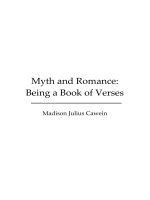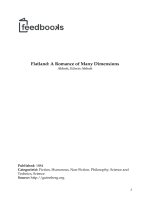King midas a romance
Bạn đang xem bản rút gọn của tài liệu. Xem và tải ngay bản đầy đủ của tài liệu tại đây (1.03 MB, 245 trang )
TheProjectGutenbergEBookofKingMidas,byUptonSinclair
ThiseBookisfortheuseofanyoneanywhereatnocostandwith
almostnorestrictionswhatsoever.Youmaycopyit,giveitawayor
re-useitunderthetermsoftheProjectGutenbergLicenseincluded
withthiseBookoronlineatwww.gutenberg.org
Title:KingMidas
Author:UptonSinclair
ReleaseDate:January,2004[EBook#4923]
ThisfilewasfirstpostedonMarch27,2002
LastUpdated:March10,2018
Language:English
***STARTOFTHISPROJECTGUTENBERGEBOOKKINGMIDAS***
TextfileproducedbyCharlesAldarondo
HTMLfileproducedbyDavidWidger
KINGMIDAS
AROMANCE
ByUptonSinclair
IdreamedthatSoulmightdarethepain,
Unliketheprinceofold,
Andwrestfromheaventhefierytouch
Thatturnsallthingstogold.
NewYorkandLondon
1901
NOTE
Inthecourseofthisstory,theauthorhashadoccasiontorefertoBeethoven's
Sonata Appassionata as containing a suggestion of the opening theme of the
Fifth Symphony. He has often seen this stated, and believed that the statement
wasgenerallyacceptedastrue.Sincewriting,however,hehasheardtheopinion
expressed,byamusicianwhoisqualifiedtospeakasanauthority,thatthetwo
themeshavenothingtodowitheachother.Theauthorhimselfisnotcompetent
to have an opinion on the subject, but because the statement as first made is
closelyboundupwiththestory,hehasallowedittostandunaltered.
ThetwoextractsfromMacDowell's“WoodlandSketches,”onpages214and
291, are reprinted with the kind permission of Professor MacDowell and of
ArthurP.Schmidt,publisher.
CONTENTS
PARTI
CHAPTERI
CHAPTERII
CHAPTERIII
CHAPTERIV
CHAPTERV
CHAPTERVI
CHAPTERVII
CHAPTERVIII
CHAPTERIX
CHAPTERX
CHAPTERXI.
CHAPTERXII.
CHAPTERXIII
PARTII
CHAPTERI
CHAPTERII
CHAPTERIII
CHAPTERIV
PARTI
InthemerrymonthofMay.
KINGMIDAS
CHAPTERI
“OMadchen,Madchen,
Wielieb'ichdich!”
Itwasthattimeofyearwhenalltheworldbelongstopoets,fortheirharvest
ofjoy;whenthosewhoseekthecountrynotforbeauty,butforcoolness,haveas
yetthoughtnothingaboutit,andwhenthosewhodwellinitallthetimearetoo
busyplantingforanotherharvesttohaveanythoughtofpoets;sothatthelatter,
andthe few others who keep somethingintheirheartstochimewiththegreat
spring-music,havethewoodsandwatersallfortheirownfortwojoyfulmonths,
fromthetimethatthefirstsnowybloodroothasblossomed,untilthewildrose
has faded and nature has no more to say. In those two months there are two
weeks,theonesthatusherintheMay,thatbeartheprizeofalltheyearforglory;
thecommonesttreesweargreenandsilverthenthatwouldoutshineacoronation
robe,andifamanhasanyofthatprodigalityofspiritwhichmakesimagination,
hemayhearthesongofalltheworld.
ItwasonsuchaMaymorninginthemidstofagreatforestofpinetrees,one
of those forests whose floors are moss-covered ruins that give to them the
solemnity of age and demand humility from those who walk within their
silences. There was not much there to tell of the springtime, for the pines are
unsympathetic,butitseemedasifallthemorewealthhadbeenflungabouton
thecarpetingbeneath.Wherethemosswasnotwereflowingbedsoffern,and
the ground was dotted with slender harebells and the dusty, half-blossomed
corydalis,whilefromalltherocksthebrightredlanternsofthecolumbinewere
dangling.
Ofthebeautysowonderfullysquanderedtherewasbutonewitness,ayoung
manwhowaswalkingslowlyalong,steppingasitseemedwheretherewereno
flowers; and who, whenever he stopped to gaze at a group of them, left them
unmolestedintheirhappiness.Hewastallandslenderlybuilt,withapaleface
shadowedbydarkhair;hewascladinblack,andcarriedinonehandahalf-open
book,which,however,heseemedtohaveforgotten.
A short distance ahead was a path, scarcely marked except where the halfrottedtreesweretroddenthrough.Downthistheyoungmanturned,andawhile
later,ashisearwascaughtbythesoundoffallingwater,hequickenedhissteps
atrifle,untilhecametoalittlestreamletwhichflowedthroughtheforest,taking
foritsbedthefairestspotinthatwonderlandofbeauty.Itfledfromrocktorock
coveredwiththebrightestofbrightgreenmossandwithtenderfernthatwasbut
halfuncurled,anditflashedinthesunlitplacesandtinkledfromthedeepblack
shadows, ever racing faster as if to see what more the forest had to show. The
youngman'slookhadbeenanxiousbefore,buthebrightenedinspiteofhimself
inthecompanyofthestreamlet.
Notfarbeyondwasaplacewhereatinyrillfloweddownfromthehighrocks
above,andwherethepathbroadenedoutconsiderably.Itwasadarklyshadowed
spot,andthelittlerillwasgatheredinasunkenbarrel,whichthegeniusofthe
placehadmadehastetocoverwiththegreenuniformwornbyallelsethatwas
to be seen. Beside the spring thus formed the young man seated himself, and
afterglancingimpatientlyathiswatch,turnedhisgazeuponthebeautythatwas
about him. Upon the neighboring rocks the columbine and harebell held high
revel,buthedidnotnoticethemsomuchasanewsightthatflasheduponhis
eye; for the pool where the two streamlets joined was like a nest which the
marsh-marigold had taken for its home. The water was covered with its bright
greenandyellow,andtheyoungmangazedattheblossomswitheagerdelight,
until finally he knelt and plucked a few of them, which he laid, cool and
gleaming,upontheseatbythespring.
The flowers did not hold his attention very long, however; he rose up and
turnedawaytowardswhere,afewstepsbeyond,theopencountrycouldbeseen
between the tree trunks. Beyond the edge of the woods was a field, through
whichthefootpathandthestreamletbothran,theformertojoinaroadleading
to a little town which lay in the distance. The landscape was beautiful in its
morningfreshness,butitwasnotthatwhichtheyoungmanthoughtof;hehad
givenbutoneglancebeforehestartedbackwithaslightexclamation,hisface
turningpaler.He steppedintothe concealment of the thickbushes atoneside,
wherehestoodgazingout,motionlessexceptforaslighttrembling.Downthe
roadhehadseenawhite-cladfigurejustcomingoutofthevillage;itwastoofar
away to be recognized, but it was a young girl, walking with a quick and
springingstep,andheseemedtoknowwhoitwas.
Shehadnotgoneveryfarbeforeshecametoathickhedgewhichlinedthe
roadsideandhidherfromtheother'sview;hecouldnotseeheragainuntilshe
came to the place where the streamlet was crossed by a bridge, and where the
little path turned off towards the forest. In the meantime he stood waiting
anxiously;forwhenshereachedtherehewouldseeherplainlyforthefirsttime,
andalsoknowifshewerecomingtothespring.Shemusthavestoppedtolook
at something, for the other had almost started from his hiding place in his
eagerness when finally she swept past the bushes. She turned down the path
straighttowardshim,andheclaspedhishandstogetherindelightashegazedat
her.
And truly she was a very vision of the springtime, as she passed down the
meadows that were gleaming with their first sprinkling of buttercups. She was
cladinadressofsnowywhite,whichthewindsweptbeforeherasshewalked;
andithadstolenonestrandofhergoldenhairtotossaboutandplaywith.She
camewithalltheeagernessandspringofthebrookletthatdancedbesideher,her
cheeksglowingwithhealthandfilledwiththelaughterofthemorning.Surely,
ofalltheflowersoftheMay-timethereisnonesofairasthemaiden.Andthe
youngmanthoughtashestoodwatchingherthatinalltheworldtherewasno
maidensofairasthis.
Shedidnotseehim,forhereyeswereliftedtoalittlebobolinkthathadcome
flyingdownthewind.Onedoesnothearthebobolinkathisbestunlessonegoes
tohearhim;forsheerglorifiedhappinessthereisinallourlandnobirdlikehim
atthehourofsunrise,whenheisdrunkwiththemorningbreezeandthesightof
thedew-filledroses.Atpresentashowerhadjustpassedandthebobolinkmay
havethoughtthatanotherdawnhadcome;orperhapshesawthemaiden.Atany
rate,heperchedhimselfuponthetopmostleafofthemapletree,stillhalf-flying,
asifscorningeventhatmuchsupport;andtherehesanghissong.Firsthegave
his long prelude that one does not often hear—a few notes a score of times
repeated, and growing swift and loud, and more and more strenuous and
insistent; as sometimes the orchestra builds up its climax, so that the listener
holdshisbreathandwaitsforsomething,heknowsnotwhat.Thenhepauseda
momentandturnedhisheadtoseeifthegirlwerewatching,andfilledhisthroat
andpouredouthiswonderfulgushingmusic,withitswateryandbell-liketone
that only the streamlet can echo, from its secret places underneath the banks.
Againandagainhegaveitforth,thewhitepatchesonhiswingsflashinginthe
sunlightandbothhimselfandhissongonethrillofjoy.
Thegirl'sfacewaslitupwithdelightasshetrippeddownthemeadowpath.A
gustofwindcameupbehindher,andbowedthegrassandtheflowersbeforeher
andswungthebirduponthetree;andsolightwasthegirl'sstepthatitseemedto
liftherandsweepheronward.Asitgrewstrongershestretchedoutherarmsto
it and half leaned upon it and flung her head back for the very fullness of her
happiness.Thewindtossedherskirtsabouther,andstoleanothertressofhair,
andswungthelilywhichshehadpluckedandwhichshecarriedinherhand.It
isonlywhenonehasheardmuchmusicthatheunderstandsthemorningwind,
and knows that it is a living thing about which he can say such things as that;
oneneedsonlytotrainhisearandhecanhearitsfootstepsuponthemeadows,
andhearitcallingtohimfromthetopsofthetrees.
Thegirlwastheveryspiritofthewindatthatmoment,andsheseemedtofeel
that some music was needed. She glanced up again at the bobolink, who had
ceased his song; she nodded to him once as if for a challenge, and then, still
leaningbackuponthebreeze,andkeepingtimewiththeflowerinherhand,she
brokeoutintoahappysong:
“Iheardastreamletgushing
Fromoutitsrockybed,
Fardownthevalleyrushing,
Sofreshandclearitsped.”
But then, as if even Schubert were not equal to the fullness of her heart, or
becausethelanguageofjoyhasnowords,sheleftthesongunfinishedandswept
oninawildcarolthatroseandswelledandmadetheforestecho.Thebobolink
listened and then flew on to listen again, while still the girl poured out her
breathless music, a mad volley of soaring melody; it seemed fairly to lift her
fromherfeet,andshewashalfdancingasshewent.Therecameanothergustof
wind and took her in its arms; and the streamlet fled before her; and thus the
three,inonewildburstofhappiness,sweptintothewoodlandtogether.
Thereinitsshadowsthegirlstoppedshort,hersongcutinhalfbythesightof
theoldforestinitsmajesty.Onecouldnothaveimaginedagreatercontrastthan
the darkness and silence which dwelt beneath the vast canopy, and she gazed
aboutherinrapture,firstatthetreesandthenattheroyalcarpetofgreen,starred
withitsfieldsofflowers.Herbreastheaved,andshestretchedoutherarmsasif
shewouldhaveclaspeditalltoher.
“Oh,itissobeautiful!”shecriedaloud.“Itissobeautiful!”
Inthemeantimetheyoungman,stillunseen,hadbeenstandingintheshadow
ofthebushes,drinkinginthesight.Thelandscapeandthefigureandthesong
hadallfadedfromhisthoughts,orratherblendedthemselvesasahaloaboutone
thing,thefaceofthisgirl.Foritwasoneofthosefacesthatamanmayseeonce
inalifetimeandkeepasahauntingmemoryeverafterwards,asavisionofthe
sweetness and glory of woman; at this moment it was a face transfigured with
rapture,andthemanwhowasgazinguponitwastrembling,andscarcelyaware
ofwherehewas.
Forfullyaminutemorethegirlstoodmotionless,gazingaboutattheforest;
thenshechancedtolooktowardsthespring,whereshesawtheflowersuponthe
seat.
“Why, someone has left a nosegay!” she exclaimed, as she started forward;
butthatseemedtosuggestanotherthoughttoher,andshelookedaround.Asshe
did so she caught sight of the young man and sprang towards him. “Why,
Arthur!Youhere!”shecried.
Theotherstartedforwardasifhewouldhaveclaspedherinhisarms;butthen
recollectinghimselfhecameforwardveryslowly,halfloweringhiseyesbefore
thegirl'sbeauty.
“Soyourecollectme,Helen,doyou?”hesaid,inalowvoice.
“Recollect you?” was the answer. “Why, you dear, foolish boy, of course I
recollectyou.Buthowintheworlddoyoucometobehere?”
“Icameheretoseeyou,Helen.”
“Toseeme?”exclaimedshe.“Butprayhow—”andthenshestopped,anda
lookofdelightsweptacrossherface.“YoumeanthatyouknewIwouldcome
herethefirstthing?”
“Idoindeed.”
“Why,thatwasbeautiful!”sheexclaimed.“IamsogladIdidcome.”
Theglancewhichshegavemadehisheartleapup;foramomentortwothey
weresilent,lookingateachother,andthensuddenlyanotherthoughtstruckthe
girl.“Arthur,”shecried,“Iforgot!Doyoumeantotellmethatyouhavecome
allthewayfromHilltown?”
“Yes,Helen.”
“Andjusttoseeme?”
“Yes,Helen.”
“Andthismorning?”
She received the same answer again. “It is twelve miles,” she exclaimed;
“whoeverheardofsuchathing?Youmustbetiredtodeath.”
Sheputoutherhand,whichhetooktremblingly.
“Let us go sit down on the bench,” she said, “and then we can talk about
things.Iamperfectlydelightedthatyoucame,”sheaddedwhenshehadseated
herself, with the marigolds and the lily in her lap. “It will seem just like old
times;justthinkhowlongagoitwasthatIsawyoulast,Arthur,—threewhole
years!Anddoyouknow,asIleftthetownIthoughtofyou,andthatImightfind
youhere.”
Theyoungman'sfaceflushedwithpleasure.
“But I'd forgotten you since!” went on the girl, eyeing him mischievously;
“foroh,Iwassohappy,comingdowntheold,oldpath,andseeingalltheold
sights!Thingshaven'tchangedabit,Arthur;thewoodslookexactlythesame,
andthebridgehasn'talteredamitesincethedaysweusedtositontheedgeand
letourfeethangin.Doyourememberthat,Arthur?”
“Perfectly,”wastheanswer.
“And that was over a dozen years ago! How old are you now, Arthur,—
twenty-one—no,twenty-two;andIamjustnineteen.To-dayismybirthday,you
know!”
“Ihadnotforgottenit,Helen.”
“Youcametowelcomeme!Andsodideverythingelse.Doyouknow,Idon't
thinkI'deverbeensohappyinmylifeasIwasjustnow.ForIthoughttheold
treesgreetedme,andthebridge,andthestream!AndI'msurethatwasthesame
bobolink!Theydon'thaveany bobolinksinGermany,andsothatonewasthe
firstIhaveheardinthreeyears.Youheardhim,didn'tyou,Arthur?”
“Idid—atfirst,”saidArthur.
“Andthenyouheardme,youwickedboy!Youheardmecomeinheresinging
andtalkingtomyselflikeamadcreature!Idon'tthinkIeverfeltsolikesinging
before;theymakehardworkoutofsingingandeverythingelseinGermany,you
know, so I never sang out of business hours; but I believe I could sing all day
now,becauseI'msohappy.”
“Goon,”saidtheother,seriously;“Icouldlisten.”
“No; I want to talk to you just now,” said Helen. “You should have kept
yourself hidden and then you'd have heard all sorts of wonderful things that
you'llneverhaveanotherchancetohear.ForIwasjustgoingtomakeaspeech
totheforest,andIthinkIshouldhavekissedeachoneoftheflowers.Youmight
have put it all into a poem,—for oh, father tells me you're going to be a great
poet!”
“I'mgoingtotry,”saidArthur,blushing.
“Justthinkhowromanticthatwouldbe!”thegirllaughed;“andIcouldwrite
your memoir and tell all I knew about you. Tell me about yourself, Arthur—I
don'tmeanforthememoir,butbecauseIwanttoknowthenews.”
“There isn't any, Helen, except that I finished college last spring, as I wrote
you,andI'mteachingschoolatHilltown.”
“Andyoulikeit?”
“Ihate it;butIhaveto keepalive,totrytobeapoet.Andthatisthenews
aboutmyself.”
“Except,”addedHelen,“thatyouwalkedtwelvemilesthisgloriousSaturday
morningtowelcomemehome,whichwasbeautiful.Andofcourseyou'llstay
overSunday,nowyou'rehere;Icaninviteyoumyself,youknow,forI'vecome
hometotakethereinsofgovernment.Youneversawsuchasightinyourlifeas
my poor father has made of our house; he's got the parlor all full of those
horrible theological works of his, just as if God had never made anything
beautiful!AndsinceI'vebeenawaythatdreadfulMrs.Dalehasgottencomplete
chargeofthechurch,andshe'soneofthosecreaturesthatwouldn'tallowyouto
burnacandleintheorganloft;andfatherneverwasofanyuseforquarreling
aboutthings.”(Helen'sfather,theReverendAustinDavis,wastherectorofthe
little Episcopal church in the town of Oakdale just across the fields.) “I only
arrivedlastnight,”thegirlprattledon,ventingherhappinessinthatwayinstead
of singing; “but I hunted up two tallow candles in the attic, and you shall see
theminchurchto-morrow.Ifthere'sanycomplaintaboutthesmell,I'lltellMrs.
Daleweoughttohaveincense,andshe'llgetsoexcitedaboutthatthatI'llcarry
the candles by default. I'm going to institute other reforms also,—I'm going to
makethechoirsingintune!”
“Ifyouwillonlysingasyouweresingingjustnow,nobodywillheartherest
ofthechoir,”vowedtheyoungman,whoduringherremarkshadnevertakenhis
eyesoffthegirl'sradiantface.
Helenseemednottonoticeit,forshehadbeenarrangingthemarigolds;now
she was drying them with her handkerchief before fastening them upon her
dress.
“Yououghttolearntosingyourself,”shesaidwhileshebentherheaddown
atthattask.“Doyoucareformusicanymorethanyouusedto?”
“IthinkIshallcareforitjustasIdidthen,”wastheanswer,“wheneveryou
singit.”
“Pooh!”saidHelen,lookingupfromhermarigolds;“theideaofadumbpoet
anyway,amanwhocannotsinghisownsongs!Don'tyouknowthatifyoucould
singandmakeyourselfgloriouslyhappyasIwasjustnow,andasImeantobe
somemore,youcouldwritepoetrywheneveryouwish.”
“Icanbelievethat,”saidArthur.
“Then why haven't you ever learned? Our English poets have all been
ridiculouscreaturesaboutmusic,anyhow;Idon'tbelievetherewasoneinthis
century, except Browning, that really knew anything about it, and all their
groaningandpiningforinspirationwasnothingintheworldbutaneedofsome
music; I was reading the 'Palace of Art' only the other day, and there was that
'lordlypleasurehouse'withallitsmodernimprovements,andwithoutasoundof
music.Ofcoursethepoorsoulhadtogobacktothesufferingworld,ifitwere
onlytohearahand-organagain.”
“Thatiscertainlyanoveltheory,”admittedtheyoungpoet.“Ishallcometo
youwhenIneedinspiration.”
“Comeandbringmeyoursongs,”addedthegirl,“andIwillsingthemtoyou.
Youcanwritemeapoemaboutthatbrook,foronething.IwasthinkingjustasI
camedowntheroadthatifIwereapoetIshouldhavebeautifulthingstosayto
thatbrook.Willyoudoitforme?”
“Ihavealreadytriedtowriteone,”saidtheyoungman,hesitatingly.
“Asong?”askedHelen.
“Yes.”
“Oh,good!AndIshallmakesomemusicforit;willyoutellittome?”
“When?”
“Now,ifyoucanrememberit,”saidHelen.“Canyou?”
“If you wish it,” said Arthur, simply; “I wrote it two or three months ago,
whenthecountrywasdifferentfromnow.”
He fumbled in his pocket for some papers, and then in a low tone he read
thesewordstothegirl:
ATMIDNIGHT
Theburdenofthewinter
Theyearhaabornetoolong,
Andoh,myheartisweary
Foraspringtimesong!
Themoonbeamsshrinkunwelcomed
Fromthefrozenlake;
Ofalltheforestvoices
Thereisbutoneawake
Iseekthee,happystreamlet
Thatmurmurestonthyway,
Asachildintroubledslumber
Stilldreamingofitsplay;
Iasktheewhereinthyjourney
Thouseeestsofairasight,
Thatthouhastjoyandsinging
Allthroughthewinternight.
Helenwassilentforafewmoments,thenshesaid,“Ithinkthatisbeautiful,
Arthur;butitisnotwhatIwant.”
“Whynot?”heasked.
“Ishouldhavelikeditwhenyouwroteit,butnowthespringhascome,and
wemustbehappy.Youhaveheardthespringtimesong.”
“Yes,”saidArthur,“andthestreamlethasledmetothebeautifulsight.”
“Itisbeautiful,”saidHelen,gazingaboutherwiththatnaiveunconsciousness
which “every wise man's son doth know” is one thing he may never trust in a
woman. “It could not be more beautiful,” she added, “and you must write me
something about it, instead of wandering around our pasture-pond on winter
nightstillyourimaginationturnsitintoafrozenlake.”
Theyoungpoetputawayhispapersrathersuddenlyatthat,andHelen,after
gazingathimforamoment,andlaughingtoherself,sprangupfromtheseat.
“Come!”shecried,“whyarewesittinghere,anyway,talkingaboutallsortsof
things,andforgettingthespringtimealtogether?Ihaven'tbeenhalfashappyyet
asImeantobe.”
She seemed to have forgotten her friend's twelve mile walk; but he had
forgotten it too, just as he soon forgot the rather wintry reception of his little
song.Itwasnotpossibleforhimtoremaindullverylonginthepresenceofthe
girl'sglowingenergy;foronceuponherfeet,Helen'sdancingmoodseemedto
come back to her, if indeed it had ever more than half left her. The brooklet
struckupthemeasureagain,andthewindshookthetreesfarabovethem,totell
that it was still awake, and the girl was the very spirit of the springtime once
more.
“Oh,Arthur,”shesaidassheledhimdownthepath,“justthinkhowhappyI
oughttobe,towelcomealltheoldthingsaftersolong,andtofindthemallso
beautiful; it is just as if the country had put on its finest dress to give me
greeting,andIfeelasifIwerenothalfgayenoughinreturn.Justthinkwhatthis
springtimeis,howalloverthecountryeverythingisgrowingandrejoicing;that
iswhatIwantyoutoputintothepoemforme.”
Andsosheledhimonintotheforest,carriedonbyjoyherself,andtakingall
things into her song. She did not notice that the young man's forehead was
flushed,orthathishandwasburningwhenshetookitinhersastheywalked;if
shenoticedit,shechoseatanyratetopretendnotto.Shesangtohimaboutthe
forest and the flowers, and some more of the merry song which she had sung
before;thenshestoppedtoshakeherheadatasaucyadder'stonguethatthrust
its yellow face up through the dead leaves at her feet, and to ask that wisestlookingofallflowerswhatsecretsitknewaboutthespring-time.Lateronthey
came to a place where the brook fled faster, sparkling brightly in the sunlight
overitsshallowbedofpebbles;itwasonlyherrunawaycarolingthatcouldkeep
pacewiththat,andsohergleemountedhigher,theyoungmanathersidehalfin
atrance,watchingherlaughingfaceanddrinkinginthesoundofhervoice.
How long that might have lasted there is no telling, had it not been that the
woodscametoanend,disclosingmoreopenfieldsandavillagebeyond.“We'd
better not go any farther,” said Helen, laughing; “if any of the earth creatures
should hear us carrying on they would not know it was 'Trunkenheit ohne
Wein.'”
She stretched out her hand to her companion, and led him to a seat upon a
fallenlognearby.“Poorboy,”shesaid,“Iforgotthatyouweresupposedtobe
tired.”
“Itdoesnotmakeanydifference,”wasthereply;“Ihadn'tthoughtofit.”
“There'snoneedtowalkfarther,”saidHelen,“forI'veseenallthatIwishto
see.Howdearthiswalkoughttobetous,Arthur!”
“Idonotknowaboutyou,Helen,”saidtheyoungman,“butithasbeendear
to me indeed. I could not tell you how many times I have walked over it, all
alone,sinceyouleft;andIusedtothinkaboutthemanytimesIhadwalkedit
withyou.Youhaven'tforgotten,Helen,haveyou?”
“No,”saidHelen.
“Notone?”
“Notone.”
Theyoungmanwasrestinghisheaduponhishandandgazingsteadilyatthe
girl.
“Do you remember, Helen—?” He stopped; and she turned with her bright
cleareyesandgazedintohis.
“Rememberwhat?”sheasked.
“Doyourememberthelasttimewetookit,Helen?”
Sheflushedatrifle,andhalfinvoluntarilyturnedherglanceawayagain.
“Doyouremember?”heaskedagain,seeingthatshewassilent.
“Yes,Iremember,”saidthegirl,hervoicelower—“ButI'dratheryoudidnot
—.”Shestoppedshort.
“Youwishtoforgetit,Helen?”askedArthur.
Hewastremblingwithanxiety,andhishands,whichwereclaspedabouthis
knee, were twitching. “Oh, Helen, how can you?” he went on, his voice
breaking.“Doyounotrememberthelastnightthatwesattherebythespring,
andyouweregoingaway,nooneknewforhowlong—andhowyoutoldmethat
it was more than you could bear; and the promise that you made me? Oh,
Helen!”
Thegirlgazedathimwithafrightenedlook;hehadsunkdownuponhisknee
beforeher,andhecaughtherhandwhichlayuponthelogatherside.
“Helen!”hecried,“youcannotmeantoforgetthat?Forthatpromisehasbeen
the one joy of my life, that for which I have labored so hard! My one hope,
Helen!Icameto-daytoclaimit,totellyou—”
And with a wild glance about her, the girl sprang to her feet, snatching her
handawayfromhis.
“Arthur!”shecried;“Arthur,youmustnotspeaktomeso!”
“Imustnot,Helen?”
“No,no,”shecried,trembling;“wewereonlychildren,andwedidnotknow
themeaningofthewordsweused.Youmustnottalktomethatway,Arthur.”
“Helen!”heprotested,helplessly.
“No,no,Iwillnotallowit!”shecriedmorevehemently,steppingbackashe
startedtowardsher,andholdingclosetoherthehandhehadheld.“Ihadnoidea
therewassuchathoughtinyourmind—”
Helenstopped,breathlessly.
“—oryouwouldnothavebeensokindtome?”theotheraddedfaintly.
“Ithoughtofyouasanoldfriend,”saidHelen.“IwasbutachildwhenIwent
away.Iwishyoustilltobeafriend,Arthur;butyoumustnotactinthatway.”
Theyoungmanglancedonceather,andwhenhesawthesternlookuponher
faceheburiedhisheadinhisarmswithoutasound.
Forfullyaminutetheyremainedthus,insilence;thenasHelenwatchedhim,
herchestceasedgraduallytoheave,andagentlerlookreturnedtoherface.She
cameandsatdownonthelogagain.
“Arthur,”shesaidafteranothersilence,“canwenotjustbefriends?”
The young man answered nothing, but he raised his head and gazed at her;
and she saw that there were tears in his eyes, and a look of mute helplessness
uponhisface.Shetrembledslightly,androsetoherfeetagain.
“Arthur,”shesaidgravely,“thismustnotbe;wemustnotsithereanylonger.
Imustgo.”
“Helen!”exclaimedtheother,springingup.
But he saw her brow knit again, and he stopped short. The girl gazed about
her,andthevillageinthedistancecaughthereye.
“Listen,”shesaid,withforcedcalmness;“Ipromisedfatherthat Iwouldgo
andseeoldMrs.Woodward,whowasaskingforme.Youmaywaithere,ifyou
like,andwalkhomewithme,forIshallnotbegoneverylong.Willyoudoit?”
Theothergazedatherforamomentortwo;hewastryingtoreadthegirl's
heart,buthesawonlythequietfirmnessofherfeatures.
“Willyouwait,Arthur?”sheaskedagain.
AndArthur'sheadsankuponhisbreast.“Yes,Helen,”hesaid.Whenhelifted
itagain,thegirlwasgone;shehaddisappearedinthethicket,andhecouldhear
herfootstepsasshepassedswiftlydownthehillside.
He went to the edge of the woods, where he could see her a short distance
below,hurryingdownthepathwithastepaslightandfreeasever.Thewindhad
met her at the forest's edge and joined her once more, playing about her skirts
andtossingthelilyagain.AsArthurwatchedher,theoldmusiccamebackinto
hisheart;hiseyessparkled,andallhissoulseemedtobedancingintimewith
herlightmotion.Thusitwentuntilshecametoaplacewherethepathmusthide
herfromhisview.Theyoungmanheldhisbreath,andwhensheturnedacryof
joyescapedhim;shesawhimandwavedherhandtohimgailyassheswepton
outofhissight.
Foramomentafterwardshestoodrootedtothespot,thenwhirledaboutand
laughedaloud.Heputhishandtohisforehead,whichwasflushedandhot,and
he gazed about him, as if he were not sure where he was. “Oh, she is so
beautiful!”hecried,hisfaceapictureofrapture.“Sobeautiful!”
Andhestartedthroughtheforestaswildlyasanymadman,nowmutteringto
himselfandnowlaughingaloudandmakingtheforestechowithHelen'sname.
Whenhestoppedagainhewasfarawayfromthepath,inadesolatespot,buttho
hewasstaringaroundhim,hesawnomorethanbefore.Tremblinghadseized
hislimbs,andhesankdownupontheyellowforestleaves,hidinghisfaceinhis
hands and whispering, “Oh, if I should lose her! If I should lose her!” As old
Poloniushasit,trulyitwas“theveryecstasyoflove.”
CHAPTERII
“Adancingshape,animagegay,Tohaunt,tostartle,andwaylay.”
The town of Oakdale is at the present time a flourishing place, inhabited
principally by “suburbanites,” for it lies not very far from New York; but the
Reverend Austin Davis, who was the spiritual guardian of most of them, had
come to Oakdale some twenty and more years ago, when it was only a little
village,withastrugglingchurchwhichitwasthetaskoftheyoungclergymanto
keepalive.Perhapsthegrowthofthetownhadasmuchtodowithhissuccessas
hisownefforts;buthoweverthatmighthavebeenhehadreceivedhistemporal
reward some ten years later, in the shape of a fine stone church, with a little
parsonagebesideit.Hehadlivedthereeversince,alonewithhisonechild,—for
just after coming to Oakdale he had married a daughter of one of the wealthy
familiesoftheneighborhood,andbeenleftawidowerayearortwolater.
A more unromantic and thoroughly busy man than Mr. Davis at the age of
forty-five, when this story begins, it would not have been easy to find; but
neverthelesspeoplespokeofnolessthantworomancesthathadbeenconnected
withhislife.Oneofthemhadbeenhisearlymarriage,whichhadcreatedamild
sensation,whiletheotherhadcomeintohislifeevensooner,infactonthevery
firstdayofhisarrivalatOakdale.
Mr. Davis could still bring back to his mind with perfect clearness the first
night he had spent in the little wooden cottage which he had hired for his
residence; how while busily unpacking his trunk and trying to bring the
disordered place into shape, he had opened the door in answer to a knock and
beheldawomanstaggerinoutofthestorm.Shewasayounggirl,surelynotyet
outofherteens,herpaleandsunkenfaceshowingmarksofrefinementandof
former beauty. She carried in her arms a child of about a year's age, and she
droppedituponthesofaandsankdownbesideit,halffaintingfromexhaustion.
The young clergyman's anxious inquiries having succeeded in eliciting but
incoherent replies, he had left the room to procure some nourishment for the
exhausted woman; it was upon his return that the discovery of the romance
alludedtowasmade,forthewomanhaddisappearedinthedarknessandstorm,
andthebabywasstilllyinguponthesofa.
Itwasnotaltogetherapleasantromance,asisprobablythecasewithagood
many romances in reality. Mr. Davis was destined to retain for a long time a
vivid recollection of the first night which he spent in alternately feeding that
babywithaspoon,andinwalkingthefloorwithit;andalsotorememberthesly
glances which his parishioners only half hid from him when his unpleasant
plightwasmadeknown.
IthappenedthatthepoorhouseatHilltownnearby,towhichtheinfantwould
have gone if he had left it to the care of the county, was at that time being
“investigated,”withallthatthenameimplieswhenreferringtopublicmatters;
the clergy of the neighborhood being active in pushing the charges, Mr. Davis
feltthatatpresentitwouldlookbestforhimtoprovideforthechildhimself.As
the investigation came to nothing, the inducement was made a permanent one;
perhapsalsothememoryofthemother'swanfacehadsomethingtodowiththe
matter.Atanyratetheyoungclergyman,thobutscantilyprovidedforhimself,
managed to spare enough to engage a woman in the town to take care of the
young charge. Subsequently when Mr. Davis' wife died the woman became
Helen's nurse, and so it was that Arthur, as the baby boy had been christened,
becamepermanentlyadoptedintotheclergyman'slittlefamily.
IthadnotbeenpossibletokeepfromArthurthesecretofhisparentage,and
thefactthatitwasknowntoallservedtokeephimalooffromtheotherchildren
ofthetown,andtodrivehimstillmoretotheconfidenceofHelen.Oneofthe
phraseswhichMr.Davishadcaughtfromthemother'slipshadbeenthattheboy
was a “gentleman's son;” and Helen was wont to solace him by that reminder.
Perhaps the phrase, constantly repeated, had much to do with the proud
sensitivenessandtheresoluteindependencewhichsoonmanifesteditselfinthe
lad'scharacter.Hehadscarcelypassedtheageoftwelvebefore,thotreatedby
Mr.Daviswiththeloveandkindnessofafather,heastonishedthegoodmanby
declaringthathewasoldenoughtotakecareofhimself;andthoMr.Daviswas
bettersituatedfinanciallybythattime,nothingthathecouldsaycouldalterthe
boy's quiet determination to leave school and be independent, a resolution in
which he was seconded by Helen, a little miss of some nine years. The two
childrenhadtalkeditoverformonths,asitappeared,andconcludedthatitwas
besttosacrificeinthecauseofhonortheprivilegeofgoingtoschooltogether,
andofspendingthelongholidaysroamingaboutthecountry.
Sotheladhadservedwithchildishdignity,firstasanerrandboy,andthenas
a store clerk, always contributing his mite of “board” to Mr. Davis' household
expenses; meanwhile, possibly because he was really “a gentleman's son,” and
hadinheritedatasteforstudy,hehadmadebyhimselfaboutasmuchprogress
as if he had been at school. Some years later, to the delight of Helen and Mr.
Davis,hehadcarriedoffaprizescholarshipabovetheheadsofthegraduatesof
theHilltownHighSchool,andstillrefusingallhelp,hadgoneawaytocollege,
tosupporthimselftherewhilestudyingbysuchworkashecouldfind,knowing
wellthatatruegentleman'ssonisashamedofnothinghonest.
He spent his vacations at home, where he and Helen studied together,—or
suchratherhadbeenhishope;itwasrealizedonlyforthefirstyear.
Helen had an aunt upon her mother's side, a woman of wealth and social
position, who owned a large country home near Oakdale, and who was by no
meansinclinedtoviewwiththecomplacencyofMr.Davistheidyllicfriendship
ofthetwoyoungpeople.Mrs.Roberts,or“AuntPolly”asshewasknowntothe
family,hadplansofherownconcerningthefutureofthebeautywhichshesaw
unfoldingitselfattheOakdaleparsonage.ShesaidnothingtoMr.Davis,forhe,
being busy with theological works and charitable organizations, was not
considered a man from whom one might hope for proper ideas about life. But
with her own more practical husband she had frequently discussed the danger,
andthepossiblemethodsofwardingitoff.
To send Helen to a boarding school would have been of no use, for the
vacations were the times of danger; so it was that the trip abroad was finally
decidedupon.AuntPolly,havingtraveledherself,hadawholesomeregardfor
German culture, believing that music and things of that sort were paying
investments.Itchanced,also,thatherowneldestdaughter,whowasayearolder
than Helen, was about through with all that American teachers had to impart;
andsoaftermuchargumentwithMr.Davis,itwasfinallyarrangedthatsheand
Helen should studyinGermanytogether.Justwhen poorArthurwasreturning
homewiththesublimetitleofjunior,hisdreamofallthingsdivinewascarried
offbyAuntPolly,andafterasummerspentin“doing”Europe,wasinstalledina
girl'sschoolinLeipzig.
Andnow,threeyearshavingpassed,Helenhaslefthercousinforanotheryear
of travel, and returned home in all the glory of her own springtime and of
Nature's;whichbringsustowherewelefther,hurryingawaytopayadutycall
inthelittlesettlementonthehillside.
Thevisithadnotbeenentirelyasubterfuge,forHelen'sfatherhadmentioned
toherthattheelderlypersonwhomshehadnamedtoArthurwasexpectingto
seeherwhenshereturned,andHelenhadbeentroubledbythethoughtthatshe
wouldneverhaveanypeaceuntilshehadpaidthatvisit.Itwasbynomeansan
agreeableone,foroldMrs.Woodwardwasexceedinglydull,andHelenfeltthat
shewascalledupontomakewarupondullness.However,ithadoccurredtoher
to get her task out of the way at once, while she felt that she ought to leave
Arthur.
Thevisitprovedtobequiteasdepressingasshehadexpected,foritissadto
have to record that Helen, however sensitive to the streamlet and the flowers,
hadnottheleastsympathyintheworldforanoldwomanwhohadaverysharp
chin,whostaredatonethroughtwopairsofspectacles,andwhoseconversation
was about her own health and the dampness of the springtime, besides the
dreariestgossipaboutOakdale'sleastinterestingpeople.Perhapsitmighthave
occurredtothegirlthatitisveryforlorntohavenothingelsetotalkabout,and
thatevenoldMrs.Woodwardmighthavelikedtohearaboutsomeofthethings
in the forest, or to have been offered the lily and the marigold. Unfortunately,
however,Helendidnotthinkaboutanyofthat,butonlymovedrestlesslyabout
inherchairandgazedaroundtheuglyroom.Finallywhenshecouldstanditno
more, she sprang up between two of Mrs. Woodward's longest sentences and
remarkedthatitwasverylateandalongwayhome,andthatshewouldcome
againsometime.
Thenatlastwhenshewasoutintheopenair,shedrewadeepbreathandfled
away to the woods, wondering what could be God's reason for such things. It
wasnotuntilshewashalfwayupthehillsidethatshecouldfeelthatthewind,
whichblewnowuponherforehead,hadquitesweptawaythedepressionwhich
had settled upon her. She drank in the odors which blew from the woods, and
begansingingtoherselfagain,andlookingoutforArthur.
Shewasrathersurprisednottoseehimatonce,andstillmoresurprisedwhen
shecamenearerandraisedhervoicetocallhim;forshereachedtheforestand
came to the place where she had left him without a reply having come. She
shoutedhisnameagainandagain,untilatlast,notwithoutahalfsecretchagrin
tohavebeensoquicklyforgotten,shewasobligedtosetoutforhomealone.
“Perhapshe'sgoneonahead,”shethought,quickeningherpace.
Foratimeshewatchedanxiously,expectingtoseehisdarklycladfigure;but
she soon wearied of continued failure, and because it was her birthday, and
becausethebrookwasstillathersideandthebeautifulforeststillabouther,she
tooktosingingagain,andwasquicklyashappyandgloriousasbefore,ceasing
hercarolingandmoderatingherwoodlandpaceonlywhenshenearedthetown.
She passed down the main street of Oakdale, not quite without an exulting
consciousnessthatherwalkhadcrownedherbeautyandthatnoonewhomshe
sawwasthinkingaboutanythingelse;andsoshecametoherhome,tothedear
oldparsonage,withitsspreadingivyvines,anditstwogreatelms.
When she had hurried up the steps and shut the door behind her, Helen felt
privilegedagaintobejustasmerryasshechose,forshewasevenmoreathome
herethaninthewoods;itseemedasifeverythingwerestretchingoutitsarmsto
hertowelcomeher,andtoinvitehertocarryoutherdeclaredpurposeoftaking
thereinsofgovernmentinherownhands.
Upononesideofthehallwaywasaparlor,andontheothersidetworooms,
whichMr.Davishadusedasareceptionroomandastudy.Theparlorhadnever
beenopened,andHelenpromisedherselfajollytimesuperintendingthefixing
upofthat;ontheothersideshehadalreadytakenpossessionofthefrontroom,
symbolicallyatanyrate,byhavingherpianomovedinandhermusicunpacked,
andacaseemptiedforthebooksshehadbroughtfromGermany.Tobesure,on
theothersidewasstilladrearywalloftheologicaltreatisesinfunerealblack,but
Helenwasnotwithouthopesthatcontinueddosesofcheerfulnessmightcureher
father of such incomprehensible habits, and obtain for her the permission to
movethebookstotheattic.
Tostartthingsinthatdirectionthegirlnowdancedgailyintothestudywhere
herfatherwasintheactofwriting“thirdly,brethren,”forhisnextday'ssermon;
andcryingoutmerrily,









